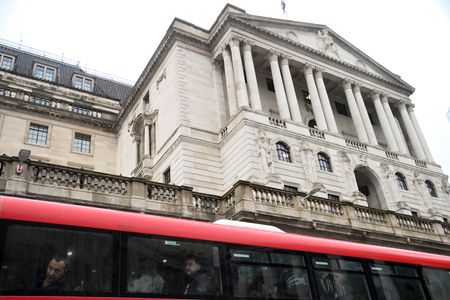 1
1 1
1
By David Milliken
LONDON (Reuters) -The Bank of England needs to push back against the risk that high inflation proves unexpectedly sticky, and may need to raise interest rates further, Monetary Policy Committee (MPC) member Jonathan Haskel said on Thursday.
Haskel – who in the past has sometimes voted for bigger interest rate rises than the majority on the MPC – was speaking a day after official figures showed inflation fell less than expected by markets when it dropped to 8.7% from 10.1%.
British government bond prices have tumbled since the data release as investors have priced in a greater number of interest rate rises by the BoE, which had previously been seen as very near the end of its rate-rising cycle.
“Further increases in Bank Rate cannot be ruled out,” Haskel said in a speech at the Peterson Institute for International Economics in Washington.
“I prefer to lean against the risks of inflation momentum. As difficult as our current circumstances are, embedded inflation would be worse.”
The BoE has raised rates 12 times since December 2021, taking interest rates to 4.5% earlier this month. Markets now expect rates to reach 5.5% by November.
Haskel added that he still regarded Britain’s labour market as “very tight”, despite some indicators of loosening, and that the ability of the economy to grow without creating excess inflation appeared to have weakened.
“The data shows little evidence of UK inflation being disproportionately due to firms raising prices,” he said.
Haskel said he hoped that an unexpected rise in core inflation in April – a measure closely watched by the BoE, which excludes volatile energy and food prices – would prove a blip.
Part of April’s increase in core goods prices reflected a renewed rise in the cost of second-hand cars, which soared during the COVID-19 pandemic, but had been expected to fall as supply constraints eased for new models, Haskel said.
“I would hope that the car prices effect is somewhat of a blip,” he said.
Haskel declined to comment on the market expectations for BoE interest rates in a question and answer session after his speech, and reiterated that policy would be tightened if inflation proved persistent.
(Reporting by David Milliken; Editing by Sachin Ravikumar and Nick Zieminski)